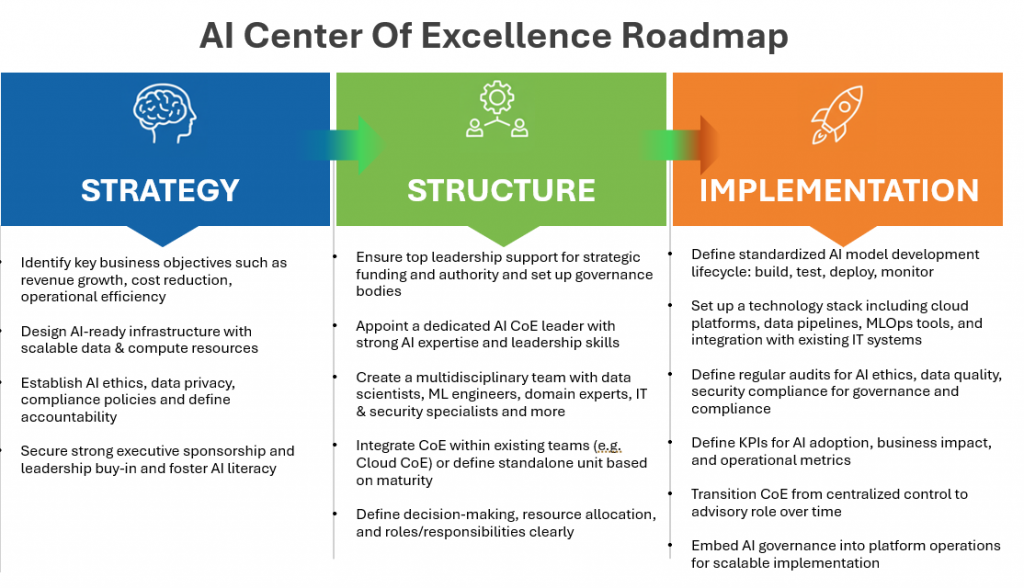How to Build an AI Center of Excellence: Strategy, Structure, and Best Practices
Establishing an AI Center of Excellence (CoE) begins with building a dedicated, expert team that drives the consistent, strategic, and value-focused adoption of AI across the enterprise. Securing executive sponsorship and appointing strong leadership are critical to ensuring every initiative aligns with overarching business objectives.
A well-structured governance model enables AI programs to be scalable, compliant, and seamlessly embedded into core business processes—transforming them from isolated experiments into drivers of long-term competitive advantage. Here’s how organizations can approach it.
What Is an AI Center of Excellence?
An AI CoE is essentially a specialized department within a company that serves as a central point of contact for AI knowledge, planning, management, and assets. The purpose of such a unit is to maximize the effectiveness of AI resources and ensure responsible stewardship of AI throughout a company.
The following are an AI CoE’s key functions and features:
- Alignment with Business Objectives: A CoE brings together the right talent, tools and technology for AI-integration and adoption, and creates a step-by-step plan for its implementation. Furthermore, it charts the process of tying this initiative to the organization’s strategic objectives that deliver measurable business value.
- Governance and Compliance: It also defines the standardized frameworks, KPIs and policies for the ethical use of AI, data privacy, the right to know, and adherence to local and international laws and regulations.
- Technical Enablement: The CoE provides and manages the AI infrastructure. This includes cloud platforms and machine learning frameworks, data pipelines, integration and collaboration infrastructure. Instead of creating and maintaining their own systems, individual teams are empowered to focus on core innovation.
- Talent Development: It attracts, develops, and retains AI talent through training, continuous learning opportunities, and fostering collaboration. By bringing together data scientists and machine learning engineers along with governance experts, it ensures consistent and scalable AI outcomes.
- Knowledge Sharing and Training: The CoE helps create a culture of lifelong learning. For this, businesses need a central place to store AI knowledge, resources, and tools. With workshops and training programs, staff members in different departments can learn more and become more familiar with AI.
- Scaling and Innovation: It accelerates experimentation, digital transformation, and innovation by supporting pilot projects and scaling successful AI solutions throughout the organization.
- Business Integration: It acts as a bridge between technical teams and business stakeholders, ensuring AI implementation is not only technically sound but also delivers tangible business impact.
- Risk Mitigation: The CoE’s governance framework guarantees the ethical and responsible use of AI. This assists the business in adhering to legal requirements and reducing any possible risks related to its implementation.
Key Steps to Build an AI Center of Excellence

The first step is to define a clear AI CoE strategy and vision. Here’s how:
Defining Strategy and Vision
Start by identifying high-value use cases that address real-world business problems. Improving customer service, optimizing supply chains, or increasing operational efficiency are some key issues to solve for.
This includes setting clear objectives, defining key performance indicators (KPIs) to measure success, and establishing a framework for ethical AI use and governance. A strong vision ensures that all AI projects have a purpose and directly contribute to the company’s success.
Structuring Your AI CoE
Once the strategy is defined, the right AI CoE structure and a team that will execute it will impact its effectiveness.
- Appoint Leadership: Find an experienced AI leader in charge of setting policy, ensuring accountability, and acting as the bridge between the technical and business teams.
- Build a Multidisciplinary Team: Assemble experts in data science, machine learning, governance, security, and key business domains. Include representatives from IT, legal, operations, and business units for a broad perspective and collaboration.
- Define Governance and Operating Model: Establish clear roles, decision rights, and accountability structures by choosing between centralized (early stage) or advisory (mature stage) models based on current needs.
- Implement Processes and Infrastructure: Develop standards for project intake, data governance, ethical and best AI practices, and knowledge sharing and provide robust technical infrastructure, including cloud and data pipelines, to support scalable AI initiatives.
- Foster Collaboration and Communication: Establish regular and clear communication channels and collaboration frameworks to ensure continuous alignment and knowledge transfer across teams.
Best Practices for AI CoE Success
Establishing an AI CoE is only the first step. Its long-term success depends on the implementation of a set of best AI practices that ensure it delivers consistent value.
Start Small and Scale
Rather than starting with complex, high-risk projects, a successful AI CoE begins with small, clear projects. These quick wins are more likely to succeed, build credibility, and show stakeholders the value of AI.
As the CoE gains experience and trust, it can gradually scale to more ambitious and transformative initiatives. This phased approach mitigates risk and fosters a culture of success.
Prioritize and Align with Business Goals
Regularly meet with business unit leaders to understand their challenges and identify where AI-based solutions can provide the most value. This ensures that the CoE is working on solutions that solve real problems and contribute to the company’s bottom line.
Foster Collaboration and Knowledge Sharing
An AI CoE should not operate in a silo. Its primary role is to be a central hub of expertise that empowers the entire organization.
This means actively encouraging people to work together by putting CoE members on different business teams and giving staff training and tools to improve their skills. The CoE can democratize AI by sharing tools, data, and the best ways to use AI.
Focus on Governance and Ethics
Successful AI CoEs don’t just build models – they build them responsibly. To do this, clear rules must be set from the start for safeguarding data, model transparency, and the moral use of AI.
By creating a robust governance framework, the CoE ensures that all AI systems are fair, unbiased, and compliant with regulations. This practice protects the company’s reputation and builds trust with customers and regulators.
Ready to build your own AI CoE? Contact our expert team to see how we can help you achieve your strategic goals.




